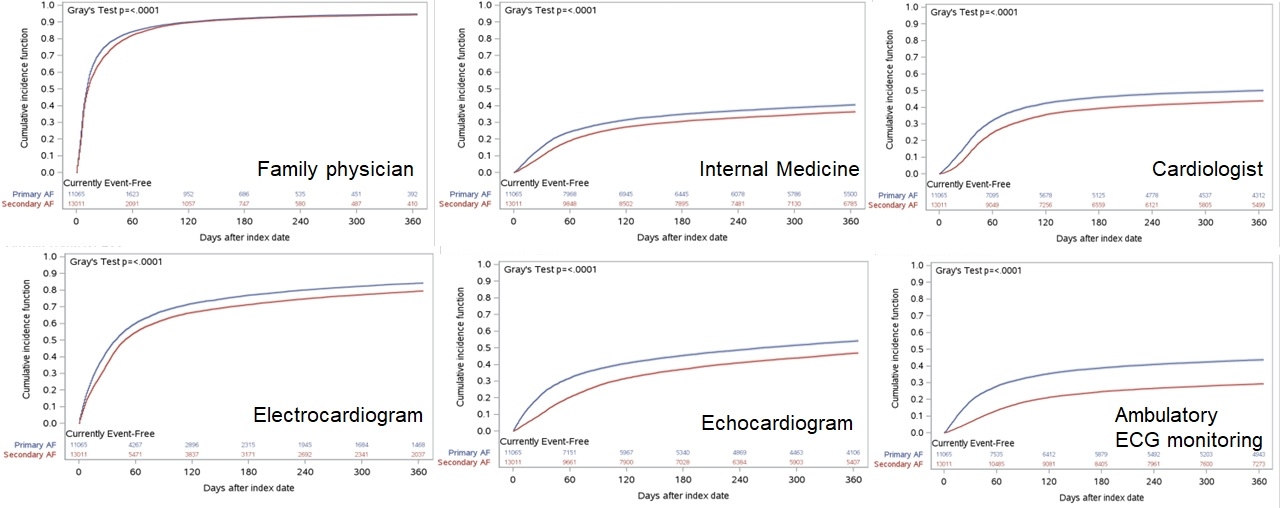Final ID: Mo2068
Physician follow up and cardiac testing after a first diagnosis with secondary vs. primary atrial fibrillation in-hospital
Abstract Body (Do not enter title and authors here): Background
Secondary atrial fibrillation (AF) is triggered by acute illness and associated with adverse outcomes. Timely follow-up is recommended by the American Heart Association statement on acute AF.
Hypotheses
Patients with secondary AF receive less follow-up and cardiac testing than those primarily hospitalized for AF (primary AF).
Follow-up is lower for secondary AF patients hospitalized for noncardiac diagnoses.
Methods
Population-based cohort study using linked administrative datasets of patients aged ≥66 yrs discharged alive after a new diagnosis of AF while hospitalized in Ontario between Apr 2013 - Mar 2019. Patients were classified as secondary or primary AF using a validated approach based on discharge diagnosis type and followed for 1yr. Outcomes included physician visits (family physicians [FP], internists, cardiologists), and cardiac testing (electrocardiograms [ECG], echocardiograms, ambulatory ECG monitoring). The cumulative incidence function was used to quantify the incidence of outcomes. Cause-specific hazards regression was used to estimate hazard ratios (HR) associated with hospitalization type in secondary AF patients. Regression analyses accounted for competing risks.
Results
We studied 13,011 secondary AF (35.2% cardiac surgery, 9.6% cardiac medical, 17% noncardiac surgery, 38.1% noncardiac medical) and 11,065 primary AF patients. Secondary AF was associated with lower age, male sex, less heart failure, and greater prevalence of other comorbidities. Less than 50% of secondary AF patients had visits to internists, cardiologists, echocardiograms or ambulatory ECG monitoring (see Figure). The incidence of all outcomes was significantly lower for secondary than primary AF. Among secondary AF patients, specialist follow-up and cardiac testing rates were lowest after noncardiac diagnoses (see Table).
Conclusion
Patients with secondary AF have less specialist follow-up and cardiac testing than primary AF, especially if hospitalized for noncardiac diagnoses.
Secondary atrial fibrillation (AF) is triggered by acute illness and associated with adverse outcomes. Timely follow-up is recommended by the American Heart Association statement on acute AF.
Hypotheses
Patients with secondary AF receive less follow-up and cardiac testing than those primarily hospitalized for AF (primary AF).
Follow-up is lower for secondary AF patients hospitalized for noncardiac diagnoses.
Methods
Population-based cohort study using linked administrative datasets of patients aged ≥66 yrs discharged alive after a new diagnosis of AF while hospitalized in Ontario between Apr 2013 - Mar 2019. Patients were classified as secondary or primary AF using a validated approach based on discharge diagnosis type and followed for 1yr. Outcomes included physician visits (family physicians [FP], internists, cardiologists), and cardiac testing (electrocardiograms [ECG], echocardiograms, ambulatory ECG monitoring). The cumulative incidence function was used to quantify the incidence of outcomes. Cause-specific hazards regression was used to estimate hazard ratios (HR) associated with hospitalization type in secondary AF patients. Regression analyses accounted for competing risks.
Results
We studied 13,011 secondary AF (35.2% cardiac surgery, 9.6% cardiac medical, 17% noncardiac surgery, 38.1% noncardiac medical) and 11,065 primary AF patients. Secondary AF was associated with lower age, male sex, less heart failure, and greater prevalence of other comorbidities. Less than 50% of secondary AF patients had visits to internists, cardiologists, echocardiograms or ambulatory ECG monitoring (see Figure). The incidence of all outcomes was significantly lower for secondary than primary AF. Among secondary AF patients, specialist follow-up and cardiac testing rates were lowest after noncardiac diagnoses (see Table).
Conclusion
Patients with secondary AF have less specialist follow-up and cardiac testing than primary AF, especially if hospitalized for noncardiac diagnoses.
More abstracts on this topic:
A novel mechanism of pediatric DCM that recapitulates aspects of the human disease via Notch signaling: a pathway to new therapeutics?
Nyarko Obed, Sucharov Carmen
A Novel Missense Mutation in TNNT2 Gene in a Lebanese Pedigree With Ebstein Anomaly And Wolf-Parkinson-White Syndrome: A Case ReportAtasi Montaser, Dankar Razan, Barakat Salim, Wehbi Jad, Refaat Marwan


